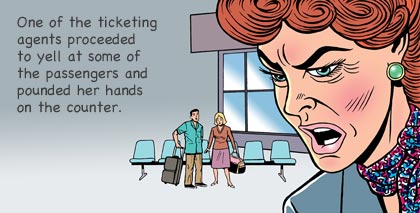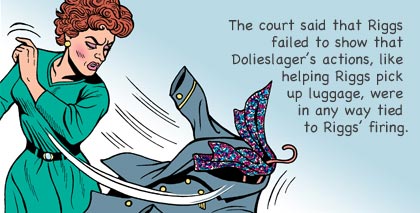AARP Hearing Center


Hear Ye! Hear Ye! explores a real court case. Read about it below and decide how you would rule. Then read the actual verdict and let us know if you agree.
Doris Riggs had a job as a customer service agent for AirTran airline at the airport in Wichita, Kan. Her duties included working at the front ticket counter, the counter at the boarding gate, and the ramp where luggage was loaded and unloaded.
A talk about age
In a casual conversation one day, Riggs’ manager, Gina Dolieslager, told Riggs about her mother’s heart surgery. Dolieslager, who was over 40 at the time, mentioned that her mother was 67 years old. Riggs said that she was the same age as Dolieslager’s mother. Her supervisor replied that Riggs did not look that old.
Riggs was not insulted by the comment, and did not feel that she should report the incident at that time. But after learning Riggs’ age, Dolieslager started helping Riggs with the luggage at the ramp, saying that Riggs was too old to be picking up the heavy bags. The comments embarrassed Riggs, but she kept her feelings to herself.
Dolieslager also complained about AirTran’s policy that gave Riggs seniority based on her age, even over other employees who had the same start date.
Ticket counter chaos
On June 5, 2003, a large tour group of children from a Mennonite choir arrived at the airport. Many of the kids wanted to have their seats changed, which complicated the job for Riggs and the four other employees assigned to work the ticket counter. After most of the group was processed, a woman from the choir asked Riggs to check in a girl who was running late. Riggs told her that passengers had to be present to be checked in. The woman became so upset that Riggs got scared.
Later that day, when Dolieslager arrived, Jeff Baird, one of the other employees working to check in the choir, told her that he had been “embarrassed to be in an AirTran uniform” because he overheard passengers talking about how rudely they had been treated by AirTran employees. Dolieslager discovered from the other employees that Riggs was the one who had been rude, and she confronted Riggs about her behavior. Riggs admitted to Dolieslager that she and her coworkers had “a rough time with this bunch.”
Action
Four days later, Jessica Senn, the choir group’s travel agent, sent an e-mail to AirTran’s national sales director. She wrote, “One of the ticketing agents, Gina, was extremely rude … [she] proceeded to yell at some of the passengers, pounded her hands on the counter and yelled ‘next’ … before the other passengers could even step away from the counter … I will not sell AirTran ever again for groups.”
When Dolieslager learned of the letter, she called Senn to figure out which employee had called herself “Gina,” Dolieslager’s first name. She discovered it was Riggs, but could not discuss it with her because Riggs was on vacation. Though she hadn’t asked Riggs about her side of the story, Dolieslager had Riggs fired for impersonating her and being rude to customers.
Too old or too rude?
Doris Riggs sued AirTran for age discrimination. She argued that it was only after discovering Riggs’ age that Dolieslager began treating her differently, including interfering with Riggs’ duties. Dolieslager picked up bags for Riggs, and tried to assign her to work at the gate rather than the more demanding ramp.
Riggs also denied being rude to customers. Because Dolieslager did not wait until Riggs returned from vacation to have her fired, Riggs told the court, she was denied the chance to explain and defend herself. She said that AirTran was using the choir incident as an excuse for age discrimination. Riggs wanted her job back.
AirTran said that Riggs’ termination had nothing to do with her age. The airline said that when Dolieslager confronted Riggs about the choir group incident, Riggs said, “Well, I might have been a little short with them ... but those damn kids wanted all their seats switched around.” AirTran took Riggs’ statement as an admission of bad behavior. In addition, two other employees confirmed Riggs’ rude behavior, and Riggs used a false name with the choir group. According to AirTran, the only reason for Riggs’ termination was her behavior on the job.
Should Doris Riggs get her job back? How would you decide? Read the verdict.


































































More From AARP
A Guide to Proper Airplane Etiquette
Follow these 10 rules for a smoother flight and friendlier skies, manners experts say